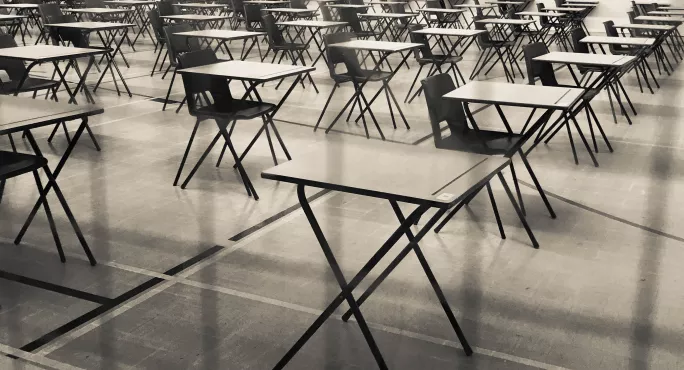- Home
- Why teacher assessment should replace GCSEs permanently
Why teacher assessment should replace GCSEs permanently

The UK government recently cancelled GCSE and A-level exams.
Instead, for this year only, teacher assessments will replace exam grades. These teacher assessments will be based on frequent low-stakes testing, performance in the classroom and homework or coursework.
This is a dramatic change, from objective standardised tests to more subjective teacher assessments. The move might be distressing for many young people and their parents. But our recent research shows that such concerns are unwarranted.
Teacher assessments during compulsory education are as reliable and stable as standardised exam scores. We can - and should - trust teacher assessments as indicators of pupils’ achievement.
This advice is based on a study carried out with a UK-representative sample of more than 10,000 children. We hope that our findings will alleviate some of the concerns of the pupils and parents affected by the exam cancellation.
Accurate assessment
The main concern held by students and parents is that teacher assessments are subjective. They fear that some of the biases and stereotypes held by teachers mean that the scores they give do not always accurately reflect students’ abilities.
But our results show that teacher assessments and exam scores match very closely for English, mathematics and science. This is the case both for the same school year and for pupils’ exam performance in later years: a teacher assessment of a seven-year-old could accurately predict how they would do in exams when they were 11.
This also holds for other exams. We found that teacher assessments were as useful as past exam results for predicting what grades pupils would get at GCSE and A-level. For instance, a teacher assessment at age 11 was almost as accurate as exams held at 11 at indicating what GCSE grade a pupil would get.
We also looked at the combined prediction of past test scores and teacher assessments to predict what grades pupils would get at GCSE and A-level. While the best way to get an accurate prediction was to use past exam scores - not surprising as we were using exams scores at one age to predict exam scores at another age - teacher assessments were nearly as good, with 90 per cent of the accuracy of past exam scores.
Our previous research shows that a range of factors contribute to performance in exams. As well as academic ability or preparation, these include things like anxiety and the student’s own beliefs about their abilities. The reason that past test scores were slightly more accurate than teacher assessment might be that these factors come into play in exams, and aren’t present in teacher assessment.
We published the results of our study before the current crisis. The results we found made us question the need for any high-stake exams in primary and secondary school education. Instead, we believe that teacher evaluations should play a greater role in assessment, even beyond this academic year.
Ongoing assessment
Teacher ratings assess performance over time, not just during a few critical and highly stressful hours of testing. In addition, ongoing teacher monitoring of student performance is essential for effective teaching. It allows teachers to make sure that pupils master the necessary material.
Teacher ratings are also largely based on in-class assessments, which promote consolidation of learning, especially when done regularly and frequently - unlike a single, high-stakes exam. As well as being highly valid and reliable measures of achievement, teacher assessments reflect students’ sustained effort and performance.
High-stakes exams can push both pupils and teachers to focus their efforts on exam taking and may shift the educational experience away from learning and towards exam performance.
The cost of exams
In addition, the costs of standardised exams are high, financially, pedagogically and psychologically.
Financially, the cost of the examination process is very high. This does not include the additional costs parents may pay for tutors.
From a teaching standpoint, exams make education less about learning the curriculum, and more about how to do well in exams.
Finally, the psychological cost affects students, parents and teachers. Students have their educational future decided over a few days of testing. Parents have to endure the build-up and aftermath of these high-stakes exams. Teachers are under enormous pressure to prepare all students to succeed.
The benefits of these exams - their greater objectivity and nationwide standardisation - do not begin to offset their costs. Our research shows there is another way.
For these reasons, our results suggest that substituting high-stakes exams for teacher assessments might be a good thing, not just during the current Covid-19 crisis, but on a permanent basis.
We call for you to trust teachers during these difficult times. We should do whatever we can to bring joy back to the classroom - or, as it is now, the virtual classroom. We must trust our teachers to teach the curriculum and to assess students’ progress and abilities. The wellbeing of students, their parents and their teachers would benefit from it.
Kaili Rimfeld, Sir Henry Wellcome Postdoctoral Fellow, King’s College London; Margherita Malanchini, Lecturer, Queen Mary University of London, and Robert Plomin, Professor of Behavioural Genetics, King’s College London
This article is republished from The Conversation under a Creative Commons license. Read the original article.
Keep reading for just £1 per month
You've reached your limit of free articles this month. Subscribe for £1 per month for three months and get:
- Unlimited access to all Tes magazine content
- Exclusive subscriber-only stories
- Award-winning email newsletters